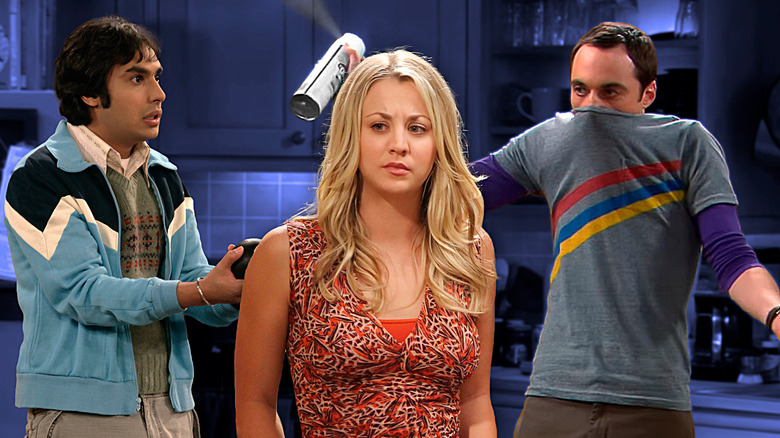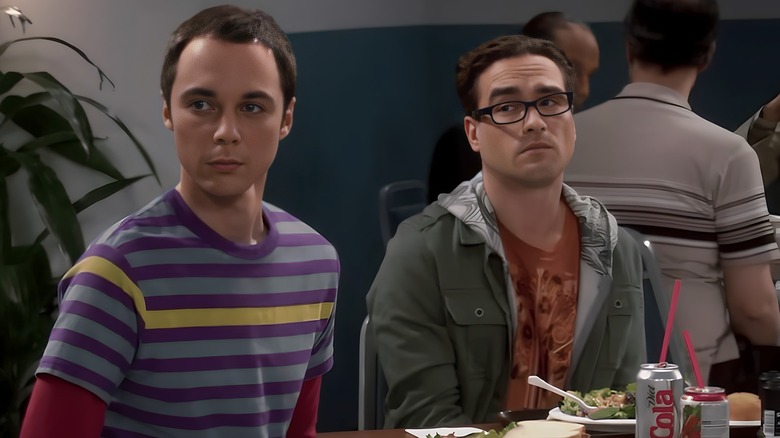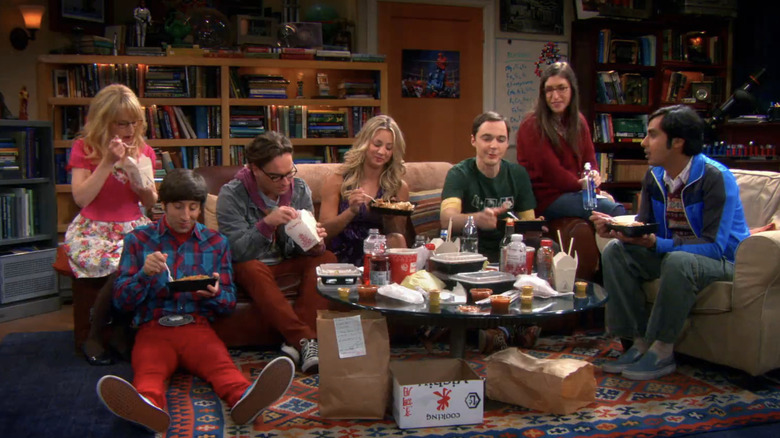Big Bang Theory Is Unbelievably Outdated - But Here's Why It Remains So Popular
Comedy is ephemeral by nature. Jokes that land really hard in the moment might feel insensitive or simply out of date after a decade or two go by. With that in mind, let's take a look at one majorly popular comedy in particular: "The Big Bang Theory."
Created by Chuck Lorre and Bil Prady, "The Big Bang Theory" was, to put it lightly, one of the biggest small-screen successes in recent memory, spanning 12 seasons from 2007 to 2019. The story centers around antisocial genius Sheldon Cooper (Jim Parsons), his roommate and best friend Leonard Hofstadter (Johnny Galecki), and their two buddies Howard Wolowitz (Simon Helberg) and Raj Koothrappalli (Kunal Nayyar), all of whom work in prestigious positions at the California Institute of Technology. In the pilot, Penny (Kaley Cuoco), the beautiful girl who lives across the hall from Leonard and Sheldon, joins the fray much to everyone's delight ... except for Sheldon.
That preamble aside, even casual viewers of the sitcom are aware of its enduring popularity. HBO paid an exorbitant amount of money back in 2019 to secure the series' exclusive streaming rights for Max, and anyone who still has cable knows that it's probably playing on TBS as you read this very sentence.
The truth is, though, that "The Big Bang Theory" has aged horribly, from its treatment of women to its jokes about "nerd culture" to the way it's even filmed. So why has it endured, and what makes it so deeply out of date?
A lot of aspects of The Big Bang Theory have aged like milk
The question isn't really, "How is 'The Big Bang Theory' outdated?" —it's where to begin. The very introduction of Kaley Cuoco's Penny sets her up as an object of desire, which gives every single guy in the group — save for Sheldon, who hates her — an opportunity to be an absolute creep to her. (Howard is especially gross when it comes to Penny, whether he's driving around a toy car topped with a camera to see up her skirt or just saying increasingly pervy things to her without worrying about offending her in the slightest.)
As for Sheldon, he eventually learns to love her but still thinks she's an imbecile. Even when the show introduces female characters into the main cast later on — Melissa Rauch's Bernadette Rostenkowski and Mayim Bialik's Amy Farrah Fowler — they're still constantly mistreated by their male partners, whether they're expected to perform every single household chore or simply regarded as inferior.
Then there's the "nerd culture" aspect, wherein Howard, Sheldon, Leonard, and Raj view themselves as dorky outcasts just because they love comic books and superhero movies. "The Big Bang Theory" premiered in 2007. "Iron Man" kicked off the Marvel Cinematic Universe in 2008. For the vast majority of the show's run, the MCU was the most popular thing in the world. Nobody would have made fun of these guys for liking Captain America in the 2010s.
Finally, there's the laugh track. Ever see that YouTube clip of "The Big Bang Theory" without the canned laughter? It's like a horror movie. By 2010, laugh tracks were outdated; this show ran until 2019.
Why exactly is The Big Bang Theory still so popular?
So we've got rampant sexism, Sheldon's (frankly terrible) attitude problems, a laugh track that was dated shortly after the show premiered, and an apparent lack of misunderstanding about who actually likes "nerdy" stuff like superhero movies. When you add all of these up, it makes "The Big Bang Theory" seem underwhelming at best and bad at worst. So why is it still so beloved? Why is it constantly on television and a hot commodity for major streamers? Why are its spin-offs spawning their own spin-offs?!
There are probably a handful of reasons at play here, and pure nostalgia for the series can't be totally ruled out. But there is a science as to why shows remain popular for years after they're initially released. In February of 2023, Vox reporter Allie Volpe spoke with Cristal Russell, a professor at Pepperdine University, about why exactly people revisit their favorite shows (and books and films), and Russell said it's not necessarily complete nostalgia. "What I found in my research is that it's not so much [participants] were yearning for the past," Russell told Volpe. "It's that the rewatching experience allowed them to appreciate how much they had grown. It wasn't yearning for the past; it was an appreciation of the present."
Beyond that, Russell said rewatching skyrocketed during the initial COVID-19 quarantine for a simple reason. "Comfort. I do think there's an element of, 'I know this is not going to disappoint me because I remember liking it.'" These are certainly a few reasons as to why "The Big Bang Theory" is still so popular — or maybe people just really love Jim Parsons.
"The Big Bang Theory" is currently streaming on Max.


